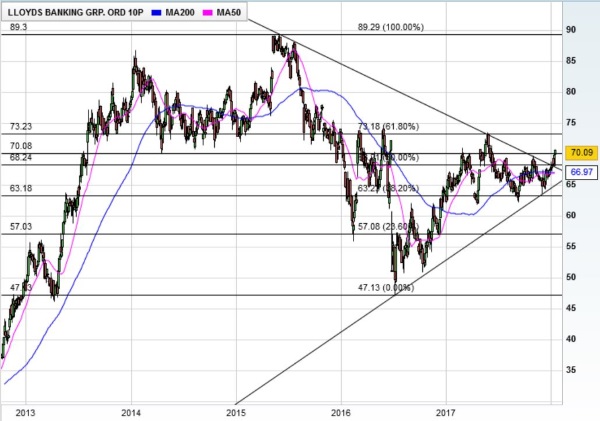UK banks and why Lloyds is worth more
16th January 2018 14:18
by Graeme Evans from interactive investor
Share on
Spooked by Brexit uncertainty, European investors continue to give British lenders including and a wide berth.
But, as analysts at investment bank UBS have pointed out in a banking note this week, there's a price at which any investment is attractive. And they believe that the risks in relation to Lloyds and Barclays, in particular, now appear overdone.
With the UK's domestic banks are currently amongst the cheapest names in Europe based on implied cost of equity, UBS has 'buy' recommendations and price targets of 85p and 220p on Lloyds and Barclays respectively.
The bank's analysts are neutral on , mainly due to uncertainty caused by outstanding litigation issues in the United States.
However, they add: "We see a good chance that all three outperform consensus [profit before tax] forecasts on lower bad debts this year whilst increased confidence on a two-year Brexit transition period could see Lloyds and Barclays re-rate."

UBS states that and valuations look overstretched, risking disappointment with FY results in the coming weeks.
In its research, UBS noted that international investors seem to be significantly underweight across UK domestic banks. However, it believes this fails to recognise that the consequences of Brexit uncertainty, such as lower growth and lower prices for housing, were now in forecasts.
And UBS analysts point out that there is the potential for a two-year Brexit transition period to result in "decent, if not stellar" macroeconomic conditions. The bank is forecasting GDP growth of 1.1% for this year.
They said: "Whatever one's personal views on the wisdom of Brexit there's a price at which any investment is attractive and the base case of a two-year transition agreement, delaying exit until 2021, doesn't seem factored into either EPS estimates or domestic bank ratings, in our view."
UBS highlighted other reasons to be more positive about UK banks, including the fact that mortgage margins expanded in November and December.
They said: "Higher rates were notable at Barclays while market leaders on price, HSBC and , also lifted rates. The Lloyds premium to mainstream peers fell to 33bps in re-mortgages, providing capacity to drive volumes in future at some cost to margin."
UBS believes that 2018 will be an important year for cost reduction, with low revenues growth and changing customer habits driving further significant branch closures.
While it expects customer churn rates to increase, it said there was no evidence to suggest that branch closures will have a major impact on market shares.
Meanwhile, forthcoming full-year results should provide some clarity on near term capital requirements following a tough 2017 stress test and introduction of a 1% countercyclical buffer from November 2018. This is the cash that banks must set aside in good times to support the economy when the going gets tougher.
Banks are also awaiting to learn their updated PRA buffer requirements, with regulators due to make an announcement in the coming weeks.
UBS believes pre-dividend capital generation at Lloyds will be sufficient to finance a dividend yield of 7.1%-8.5% in 2018-2020, even if regulators seek higher capital coverage as protection against Brexit.
On UBS numbers, Lloyds is trading on 8.9 times 2018 earnings estimates.
Though UBS sees risks to near-term earnings revisions, it also sees valuation in Barclays after it was the fourth worst-performing European bank last year.
If Barclays achieves its 9% return on tangible equity target in 2019, UBS said this implied a share trading at about 7.6x 2019 earnings per share (EPS). Even if Barclays sticks to spending plans but disappoints on income as the market forecasts, the share will be on a price/earnings (PE) ratio of 9.
This article is for information and discussion purposes only and does not form a recommendation to invest or otherwise. The value of an investment may fall. The investments referred to in this article may not be suitable for all investors, and if in doubt, an investor should seek advice from a qualified investment.